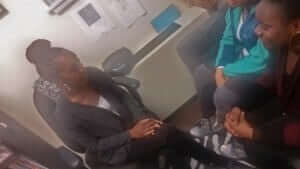Dr. Tasheka Cox, Ed.D, LICSW, is a school social worker at Luke C. Moore High School in Washington, DC.
I arrive at 8 am after battling traffic for over an hour. When I walk into my office, I drop my bags on the floor and just sit in my chair for a moment to take a few deep breaths. I need to settle myself before the bell rings and all the students start pouring into my office. As I am breathing, I think to myself, “Why was traffic so bad this morning? I didn’t see any accidents on the road. I wish I lived in a less congested area.” I realize there are things I can’t control. I have to just let go of the fact that traffic was horrible and turn my attention to the here and now. After I do my mindful breathing for a few minutes, I feel myself becoming less stressed. I walk around the school building to check in with some teachers, and remind them to take a few moments for themselves throughout the day—to just breathe in between classes.
Before I know it, it’s 8:45 and the students arrive in the building for first period class. I go back to my office to prepare for my second period mindfulness class. During this time, numerous students stop by my office. One student says that she barely made it to school this morning because her mother kicked her out a couple of nights ago. They got into another big argument and because she is over 18 , her mother told her to go find her own place to live. These are the stories some students come to school with in the morning: homelessness, evening and night work hours, partying the night before, staying up with their babies, not sleeping due to depression or anxiety, or just plain not wanting to wake up to get to school on time. Most of my mornings are filled with stories that I try to process with students before I send them off to their first classes.
Second period arrives, I’ve barely had time to prepare. But before I get up, I take a few moments to anchor myself with my breathing. Only five out of eight students show up for today’s class. Nonetheless, I carry on with today’s lesson, “Heartfulness.” I tell the students the story of the DC experiment with sending heartful wishes to the city that was once consumed with violence. I share with them how hopeful I felt when I read this story. I imagine how inspiring it must be to have a group of people seeing the impact of their mediation on something as important as the crime rate. As I talk to them, the students seem very engaged in that story. I tell them that we are going to practice something similar by sending heartful wishes to someone they know. I guide them through the exercise. Afterwards, I ask them how they felt while they were sending the wishes. One student says “Does that really work? Will my wish really come true?” I tell her that I don’t know if her wishes can come true, but I do know that anything is possible when we send loving and kind wishes out in the atmosphere. We end our session by taking a few deep breaths and I thank the students for participating in the session.
Later that day as I walk down the hall, one of the second period students stops me and says, “Thank you Dr. Cox, for doing the exercise with us this morning. I needed it, because my little cousin has been in the hospital for a few weeks now and we’re very worried about her.” I tell her that I am sorry to hear about her cousin and I pray she gets better soon. Also, I tell her to keep sending those heartful wishes to her cousin, and keep me posted on her condition.
I walk back to my office thinking about the student that just stopped me and the students I talked to earlier this morning. I can’t imagine what it must be like to come to school on a daily basis with so much stress and pain on my heart and mind. Many of my students deal with neighborhood violence, grief and loss, poverty, below average reading and math skills, abuse and neglect from their families, abandonment, teen pregnancy and parenting, and the lack of resources that they need to be successful socially, emotionally, and academically. Despite these deficits, many of our students are resilient. They fight hard each day to do what is expected of them in school and make themselves available for learning. Without my mindfulness practice, I don’t think I would be able to deal with half of what my students deal with and still show up for school. Having my mindfulness practice has given me the opportunity to create some space between what is happening all around me and the way that I react to it.
Dr. Cox was certified in our Mindful Schools Year-Long Certification program in 2016. You can find out more about her in our Certified Instructors Directory and on her website.

